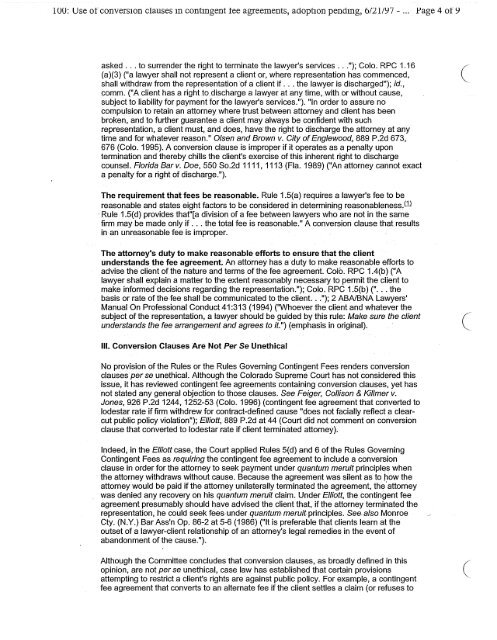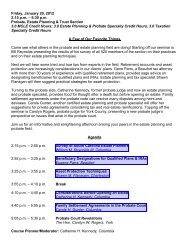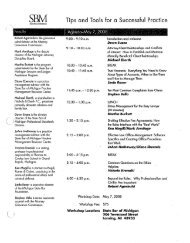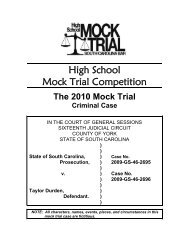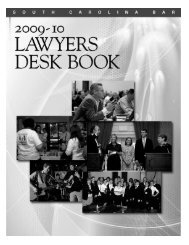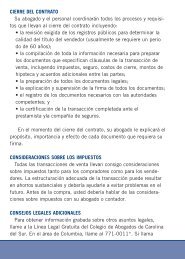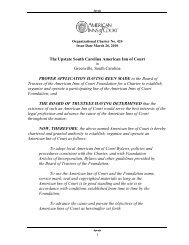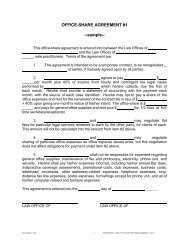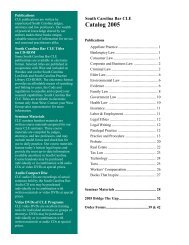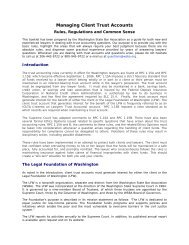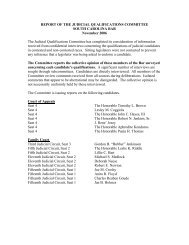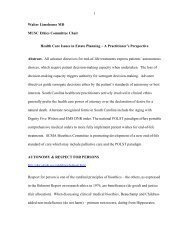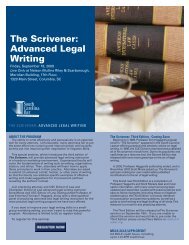Practicing With Professionalism - South Carolina Bar Association
Practicing With Professionalism - South Carolina Bar Association
Practicing With Professionalism - South Carolina Bar Association
You also want an ePaper? Increase the reach of your titles
YUMPU automatically turns print PDFs into web optimized ePapers that Google loves.
1UU: Use ot converSIOn clauses m contmgent tee agreements, adoptIOn pendmg, 6/211Y7 - ... Page 4 ot Y<br />
asked ... to surrender the right to terminate the lawyer's services ..."); Colo. RPC 1.16 (<br />
(a)(3) ("a lawyer shall not represent a client or, where representation has commenced, "-<br />
shall withdraw from the representation of a client if ... the lawyer is discharged"); id.,<br />
comm. ("A client has a right to discharge a lawyer at any time, with or without cause,<br />
subject to liability for payment for the lawyer's services."). "In order to assure no<br />
compulsion to retain an attorney where trust between attorney and client has been<br />
broken, and to further guarantee a client may always be confident with such<br />
representation, a client must, and does, have' the right to discharge the attorney at any<br />
time and for whatever reason." Olsen and Brown v. City ofEnglewood, 889 P.2d 673,<br />
676 (Colo. 1995). A conversion clause is improper if it operates as a penalty upon<br />
termination and thereby chills the client's exercise of this inherent right to discharge<br />
counsel. Florida <strong>Bar</strong> v. Doe, 550 SO.2d 1111, 1113 (Fla. 1989) ("An attorney cannot exact<br />
a penalty for a right of discharge.").<br />
The requirement that fees be reasonable. Rule 1.5(a) requires a lawyer's fee to be<br />
reasonable and states eight factors to be considered in determining reasonableness,m<br />
. Rule .1.5(d) provides that"[a division of a fee between lawyers who are not in the same<br />
firm may be made only if ... the total fee is reasonable." A conversion clause that results<br />
inan unreasonable fee is improper.<br />
The attorney's duty to make reasonable efforts to ensure that the client<br />
understands the fee agreement. An attorney has a duty to make reasonable efforts to<br />
advise the client of the nature and terms of the fee agreement. Colo. RPC 1.4(b) ("A<br />
lawyer shall explain a matter to the extent reasonably necessary to permit the client to<br />
make informed decisions regarding the representation."); Colo. RPC 1.5(b) ("... the<br />
basis or rate of the fee shall be communicated to the client. .."); 2 ABAIBNA Lawyers'<br />
Manual On Professional Conduct 41 :313 (1994) ("Whoever the client and whatever the<br />
subject of the representation, a lawyer should be guided by this rule: Make sure the client<br />
understands the fee arrangement and agrees to it.") (emphasis in original).<br />
(<br />
III. Conversion Clauses Are Not Per Se Unethical<br />
No provision of the Rules or the Rules Governing Contingent Fees renders conversion<br />
clausesper se unethical. Although the Colorado Supreme Court has not considered this<br />
issue, it has reviewed contingent fee agreements containing conversion clauses, yet has<br />
not stated any general objection to those clauses. See Feiger, Collison & Killmer v.<br />
Jones, 926 P.2d 1244, 1252-53 (Colo. 1996) (contingent fee agreement that converted to<br />
lodestar rate if firm withdrew for contract-defined cause "does not facially reflect a clearcut<br />
public policy violation"); Elliott, 889 P.2d at 44 (Court did not comment on conversion<br />
clause that converted to lodestar rate if client terminated attorney).<br />
Indeed, .in the Elliott case, the Court applied Rules 5(d) and 6 of the Rules Governing<br />
Contingent Fees as requiring the contingent fee agreement to include a conversion<br />
clause in order for the attorney to seek payment under quantum meruit principles when<br />
the attorney withdraws without cause. Because the agreement was silent as to now the<br />
attorney would be paid if the attorney unilaterally terminated the agreement, the'attorney<br />
was denied any recovery on his quantum meruit claim. Under Elliott, the contingent fee<br />
agreement presumably should have advised the client that, if the attorney terminated the<br />
representation, he could seek feesunderquantummeruit-principles. See.also Monroe<br />
Cty. (N.Y.) <strong>Bar</strong> Ass'n Op. 86-2 at 5-6 (1986) (lilt is preferable that clients learn at the<br />
outset of a lawyer-client relationship of an attorney's legal remedies in the event of<br />
abandonment of the cause.").<br />
Although the Committee concludes that conversion clauses, as broadly defined in this<br />
opinion, are not per se unethical, case law has established that certain provisions<br />
attempting to restrict a client's rights are against public policy. For example, a contingent<br />
fee agreement that converts to an alternate fee if the client settles a claim (or refuses to<br />
(


